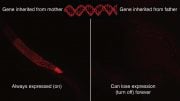
Epigenetics is the study of changes in gene activity that do not involve alterations to the underlying DNA sequence. These changes can be influenced by environmental factors such as diet, exposure to toxins, and stress, and can affect how genes are expressed, leading to differences in traits and behaviors among individuals with the same DNA.
A recent study in mice has found that a history of obesity resulting from a high-fat diet can induce lasting changes in innate immunity that can promote inflammatory diseases. These changes persist and continue to impact the body even after weight loss and a return to normal metabolism.
According to the authors of the study, if the findings in mice hold true in humans, the persistent epigenetic changes resulting from obesity caused by a high-fat diet could increase the likelihood of developing neuroinflammatory diseases related to aging. One such disease is age-related macular degeneration, which has been previously linked to obesity and can lead to permanent blindness in older individuals.
However, the mechanisms through which obesity predisposes one to the condition aren’t well defined. Perhaps related, the long-term impact of prior obesity on the immune response later in life also remains unknown. Across a series of experiments in mice, Masayuki Hata and colleagues show that adipose tissue macrophages from mice fed a high-fat diet exhibit epigenetic changes that led to increased expression of genes that function in inflammatory responses.
This expression continued after mice returned to a normal weight and regained metabolic normalcy, the authors say. According to Hata et al., these persistent epigenetic changes occurred during an obese period when fatty acids like steric acid altered adipose resident macrophages toward a proinflammatory phenotype, which is retained during aging.
These resident inflammatory cells can travel to other parts of the body, including the eye, where they initiate an inflammatory program that promotes age-related macular degeneration.
“The study by Hata et al. raises important questions about the upstream pathways that are responsible for epigenetic reprogramming in macrophages and whether targeting these pathways can reverse epigenetic changes,” write Kevin Mangum and Katherine Gallagher in a related Perspective.
Reference: “Past history of obesity triggers persistent epigenetic changes in innate immunity and exacerbates neuroinflammation” by Masayuki Hata, Elisabeth M. M. A. Andriessen, Maki Hata, Roberto Diaz-Marin, Frédérik Fournier, Sergio Crespo-Garcia, Guillaume Blot, Rachel Juneau, Frédérique Pilon, Agnieszka Dejda, Vera Guber, Emilie Heckel, Caroline Daneault, Virginie Calderon, Christine Des Rosiers, Heather J. Melichar, Thomas Langmann, Jean-Sebastien Joyal, Ariel M. Wilson and Przemyslaw Sapieha, 5 January 2023, Science.
DOI: 10.1126/science.abj8894









Be the first to comment on "Persisting Even After Weight Loss: Obesity Can Trigger Lasting Epigenetic Changes That Can Promote Inflammatory Disease"